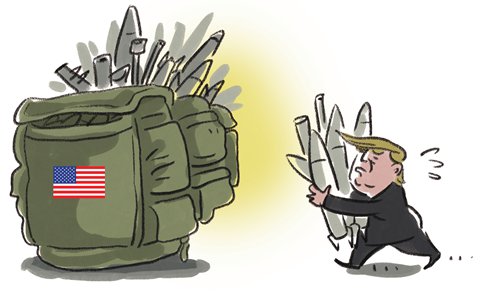
Illustration: Liu Rui/GT
The White House has proposed a budget of nearly $720 billion for the Pentagon for fiscal 2020, adding $33 billion to counter military expansion by China and Russia, take on some "rogue states" and fight the Islamic State terror group.
It is not unusual that the US has been specific in targeting China and Russia. Washington has released several core reports in recent years, including the US National Security Strategy (NSS), National Defense Strategy, Nuclear Posture Review and Missile Defense Review, underscoring the so-called China and Russia threats and a new chapter in competition among great powers.
As a guiding document for US defense, the NSS, published in December 2017, has regarded China and Russia as the main security threats. Following the NSS' lead, Washington's concentrated fire on Beijing and Moscow has become an inexorable trend.
It is crystal clear that US President Donald Trump is relying on military spending in a bid to play the big power game, especially with China and Russia.
Last December, Trump proposed to cut US defense spending, tweeting "The US spent 716 Billion Dollars this year. Crazy!" He also called for China's and Russia's moves to "start talking about a meaningful halt to what has become a major and uncontrollable Arms Race." But the defense budget for fiscal 2020, the highest ever in US history, seems even crazier.
Notwithstanding the inconsistency in Trump's words, his basic thinking of defense is relatively consistent. Different from former US president Barack Obama, Trump has always emphasized "America First" and "securing peace through strength."
That his fundamental idea has never changed is backed by various examples such as the sharply increasing military expenditure, and renaming of the US' oldest and largest military command — the Pacific Command — to Indo-Pacific Command.
Washington often has excuses to accuse others of posing so-called security threats. The US' concerns about Russia lie in both hard and soft power. Russia, which possesses a vast arsenal of nuclear weapons and missiles, is trying to develop supersonic equipment and other weapons systems. In addition, Washington has claimed that Russia not only interfered in US domestic politics by meddling in elections, but also threatened its neighboring countries' territorial integrity and challenged the international order.
Beijing is also deemed as Washington's target. But it should be made clear that China has no intention of threatening other countries. On the contrary, it is the US that has always maintained an aggressive and confrontational approach to deal with international relations. Washington has neglected the basic consensus and tacit understanding with Beijing on the South China Sea issue and the Taiwan question. The US is also making an issue of the Tibet question.
According to statistics from the London-based International Institute for Strategic Studies, the US military expenditure in 2018 reached $643 billion, nearly four times second-ranking China ($168.2 billion) and 10 times Russia ($63.1 billion). Washington has regarded Beijing and Moscow as political and military targets, betraying its strategic anxiety and overreaction.
China just announced its military budget outlay for 2019 at $177.6 billion with a growth rate of 7.5 percent, much lower than the 8.1 percent in 2018. It also marks the fourth consecutive year in which China's defense budget registered a single-digit increase.
There is still a wide gap between Beijing and Washington with regard to both military spending and equipment. Hence the so-called China threat theory is totally groundless.
Regardless of rivalry and differences between the major powers, common interests in regional security and global issues are paramount. But Washington's doctrines of "America First" and "Make America Great Again" have overlooked common interests and reduced the possibility of cooperation.
If the US continues to be hostile, the "China and Russia threat" theory inside Washington may become a self-fulfilling prophecy, which will be extremely harmful to itself.
The author is the director for Strategic Studies Institute of American Studies, Chinese Academy of Social Sciences. opinion@globaltimes.com.cn
